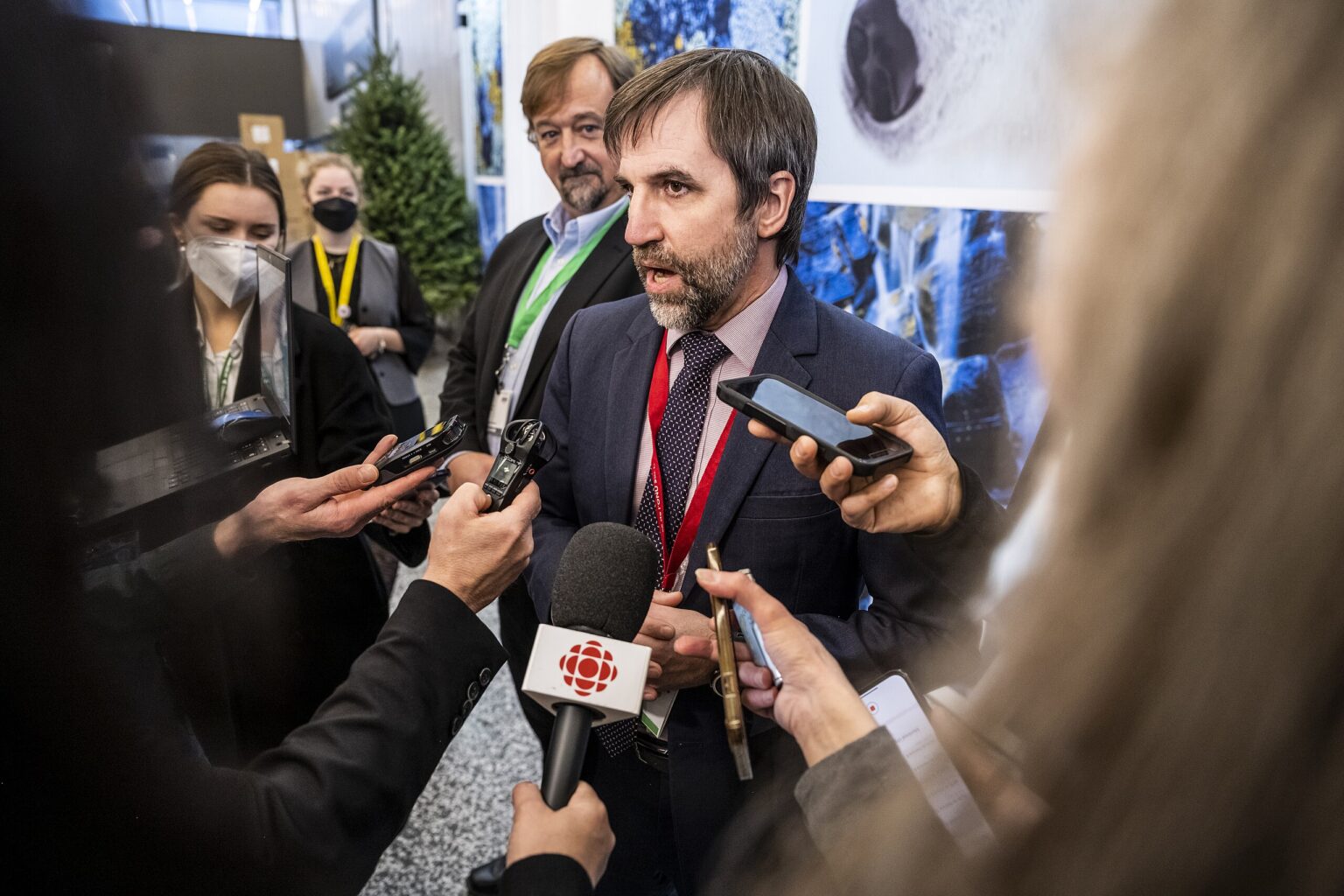While Canadian oil companies and their lobbyists have scrubbed mentions of carbon capture from their websites amid greenwashing concerns, Canadian government officials continue repeating unproven claims about the controversial technology.
Various government ministers, including environment minister Steven Guilbeault, have championed carbon capture (CCS) technology in recent press announcements and social media statements, despite mounting evidence CCS is not a viable climate change mitigation strategy.
Subscribe to our newsletter
Stay up to date with DeSmog news and alerts
It is in part because of the oil and gas industry’s allegedly misleading statements about CCS that the Canadian government introduced new anti-greenwashing amendments to the Competition Act. These new amendments provoked many Canadian oil and gas companies to remove environmental pledges and goals from their websites, including information about CCS. The Pathways Alliance, a consortium of Canadian tar sands oil producers that has been aggressively promoting a carbon capture project in Alberta, removed all content from their website on June 19 in anticipation of these new regulations. Pathways has since added some new content to their website, though there are far fewer details about the group’s interest in CCS.
In recent weeks, sitting ministers in the government of Canada have made several announcements or statements concerning carbon capture projects. In mid July, Strathcona Resources Ltd. announced it would enter into a partnership with the Canada Growth Fund — a public investment agency of Canada’s federal government — to split $2 billion CAD of new investments in CCS infrastructure for the company’s tar sands operations in Alberta and Saskatchewan.
The joint funding may not actually be as equal as government and industry have indicated. According to Julia Levin, Associate Director, National Climate, with Environmental Defence Canada, Strathcona may not even cover half their capital costs, given their expectation these costs will be covered by the federal CCS investment tax credit and other grants. Indeed, according to Strathcona’s press release concerning the project, the company that “Substantially all of Strathcona’s share of capital costs is expected to be recouped through the federal CCS investment tax credit and other grants.”
“The Government of Canada is providing yet another oil company with a massive handout,” said Levin in a statement to DeSmog.
“Almost exactly a year ago, the Government of Canada released new rules ending fossil fuel subsidies. Yet they continue to break their promise by providing billions of dollars to some of the wealthiest companies in Canada. Despite carbon capture’s terrible track record, governments keep subsidizing the technology.”
Despite these and other concerns from environmentalists and climate scientists about CCS, Canada’s environment minister, Steven Guilbeault, was particularly enthusiastic about the news, writing on social media that “it pays to put the tools in place that build a cleaner economy and a more sustainable future.”
Bravo👏
— Steven Guilbeault (@s_guilbeault) July 11, 2024
Major carbon capture project made possible by the Canada Growth Fund, showing it pays to put the tools in place that build a cleaner economy and a more sustainable future.
Best quote from the exec: “Canadian producers “have a moral obligation to reduce their emissions” https://t.co/ShWiXNbmBX
Whether this is in fact the case — that investments in CCS will lead to either a cleaner economy or a more sustainable future — is an issue at the heart of the government’s new anti-greenwashing regulations. Environmental claims must be based on an adequate and proper test, according to the legislation, and the burden of proof lies with whoever makes the original claim.
If Guilbeault were representing a tar sands producer, rather than the government of Canada, he may have reconsidered his statement. Canadian tar sands producers removed similar claims from their websites in the days before the anti-greenwashing regulations went into effect June 20. Cenovus, a partner in the Pathways Alliance, removed a section of their website titled “Innovation: The gateway to sustainable advancements” that concerned carbon capture technology. DeSmog found 70 distinct URLs linking to the websites of Pathways members, or the website of the Canadian Association of Petroleum Producers (CAPP), that mentioned carbon capture that had been removed since the federal anti-greenwashing regulations took effect.
CCS studies shed some light on these sudden website deletions. A landmark Global Witness report from 2022 revealed Shell Canada’s Quest hydrogen project, which uses carbon capture, created more emissions than it sequestered. According to an International Institute for Sustainable Development (IISD) report from November of 2023, there are just 30 commercial CCS projects operating globally, capturing less than 0.2 percent of the emissions required to close the emissions gap by 2030. Moreover, a majority of the 149 CCS projects that were to be operational by 2020 were either cancelled or put on indefinite hold due to technological challenges or exceptionally high costs.
Another IISD study found CCS is inconsistent with Canada’s net zero ambitions. It is expensive, slow to implement, energy intensive, and unproven at scale. Nearly all CCS projects are either being used for enhanced oil recovery, and irrespective of however much carbon dioxide is captured by the process, it has no positive impact whatsoever on downstream emissions.
“Carbon capture technology has failed to make a dent in reducing climate pollution, despite decades of subsidies,” said Environmental Defence’s Julia Levin. “It is a dangerous distraction driven by the same big polluters who have caused the climate emergency. Why should taxpayers be on the hook to pay for ineffective, unnecessary, and risky technology?” asked Levin.
There doesn’t appear to be any obligation for Canada’s environment minister to be held to the same standard as oil and gas companies when it comes to making claims about the effectiveness of carbon capture.
Canada’s natural resources minister, Jonathan Wilkinson, made similarly enthusiastic and unverifiable comments concerning carbon capture in a recent interview with the Globe and Mail. Wilkinson said that he believes 20 to 25 new carbon capture projects would break ground in Canada in the next decade. Wilkinson said this would likely be the case owing to a new federal government investment tax credit for carbon capture and storage projects, which could cover up to half the capital costs of new projects.
Wilkinson stated to the Globe and Mail that the new Shell Polaris CCS project was a direct result of the investment tax credit.
Wilkinson’s statements on social media concerning the Strathcona project insinuated that the tax credit was helping companies achieve their net zero ambitions: “Canada’s new investment tax credits have helped companies move expeditiously to improve their competitiveness in a world that’s rapidly moving towards net-zero.” Wilkinson continued, insinuating that the Strathcona CCS project would work towards decarbonization, stating: “Strathcona Resources is innovating to seize the economic opportunity decarbonization presents and creating jobs now and into the future.”
When asked by the Globe and Mail for his thoughts on Pathways Alliance’s massive CCS proposal, Wilkinson was optimistic the project would be completed, and that “We are still working a little bit on the structure of that. But I do believe that it will move forward. There’s just a bit more work to do to finish the job.”
In May 2023, Pathways Alliance was the subject of an investigation by Canada’s Competition Bureau over allegations of false and misleading claims. The complaint was initiated by Greenpeace Canada. Pathways scrubbed its website of all content in advance of the new anti-greenwashing regulations, something Wilkinson told the Globe and Mail he thought was an over-reaction.
A study published by the journal Energy Research & Social Science in the spring of 2024 indicated “instances of selective disclosure and omission, misalignment of claim and action, displacement of responsibility, non-credible claims, specious comparisons, nonstandard accounting, and inadequate reporting,” in their analysis of Pathways’ advertising over a two-year period.
Subscribe to our newsletter
Stay up to date with DeSmog news and alerts






